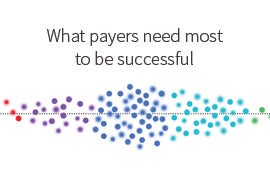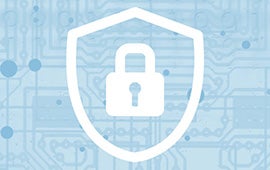
Access Enriched Patient Health Data from FHIR-enabled Patient Access APIs.
Interoperability with a FHIR-based Patient Access API
 A FHIR-enabled patient access API for interoperability allows multiple healthcare systems, applications, and devices to securely access, integrate, and exchange health data. It not only facilitates portability and healthcare consumerism, but it also provides critical data at the point of care to optimize patient outcomes.
A FHIR-enabled patient access API for interoperability allows multiple healthcare systems, applications, and devices to securely access, integrate, and exchange health data. It not only facilitates portability and healthcare consumerism, but it also provides critical data at the point of care to optimize patient outcomes.
Today, ONC and CMS are driving the development of interoperability standards, with input of industry groups, to ensure access and transfer of electronic health information (EHI) data from multiple health IT systems. As a result, a patient's clinical, demographic, and claims history can be seamlessly accessed – with the individual's consent – by payers, providers, patients and healthcare IT services organizations using the FHIR-based data format. Easy retrieval of and access to a more comprehensive view of a patient’s data through interoperability helps improve care delivery, reduce costs, and promote a better patient experience.
Interoperability Improves Patient Care
Here are a few examples of how clinical interoperability benefits our healthcare ecosystem:
Robust Patient Data Access Benefits Both Payers and Providers
Healthcare Interoperability Reduces Errors and Administrative Costs While Increasing Margins and Efficiency
Data Integration with Most Health IT Data Sources Allows Building Agile, Efficient, and Cost-effective Healthcare Systems
Mitigates Physician Burnout

Benefits for Patients
Better Quality of Care
Because individuals experience different clinical diagnoses, patients may go to a series of care settings, independent practitioners, or hospitals to support their care. Every individual interaction with a care provider adds to the patient’s unique medical history. Not having access to a comprehensive patient profile due to the lack of integrated health IT systems and data is not only inconvenient for the patient, but it can also be prone to errors and result in lower quality care. Complete and timely access to personal health records (PHR) dramatically enhances the quality of care each medical professional can provide.
not only inconvenient for the patient, but it can also be prone to errors and result in lower quality care. Complete and timely access to personal health records (PHR) dramatically enhances the quality of care each medical professional can provide.
Interoperability also provides patients more control over their medical data allowing them to make more informed decisions for better health outcomes. Through these new ONC regulations, patients are in control of their personal health data with the authority to give consent to share their data, thus creating a truly member-driven, patient-centric system of care.
Interoperability Advantage for Payers
Stay Competitive and Facilitate Growth and Expansion
 In the highly competitive healthcare space, payers must make informed strategic decisions about new markets, products, and trends while negotiating better contracts, identifying potential risks, and increasing operational efficiency. None of this is possible without access to the structured data and analytics around patients and providers in their network.
In the highly competitive healthcare space, payers must make informed strategic decisions about new markets, products, and trends while negotiating better contracts, identifying potential risks, and increasing operational efficiency. None of this is possible without access to the structured data and analytics around patients and providers in their network.With interoperability, payers – with a member's consent – can gain insight into a member's medical history or the provider networks of competing plans. Interoperability can also reduce data duplicity and repeat tests which reduces unnecessary or ineffective care and the resulting medical claims submitted for that care. This enables payers to help ensure their members receive the most effective and cost efficient care possible.
Challenges of Healthcare Interoperability
 Data security remains the most important priority for clinical interoperability as more patients begin to leverage technology to access and share their health data. The healthcare industry is a hot bed of cybersecurity attacks and data breaches as hackers continue to monetize the personal health information they steal at record levels.
Data security remains the most important priority for clinical interoperability as more patients begin to leverage technology to access and share their health data. The healthcare industry is a hot bed of cybersecurity attacks and data breaches as hackers continue to monetize the personal health information they steal at record levels. Another challenge with achieving robust and accurate health information interoperability is the amount of inaccurate data within medical records and patient health information. Health data exchanges and APIs enable appropriate and secure data access using the FHIR format. Still, multiple analyses have shown that much of this health data contains errors during data collection like wrong date of birth and incorrect name spellings.
This information passes through numerous systems through database and system integrations. Healthcare entities may need a hub and spoke data model for EMR data integration from data collection to distribution.
LexisNexis Risk Solutions provides healthcare organizations with a single Patient Access API integration point to securely access, clean, standardize, and enrich data captured across EMRs, and other health information systems. Our solution offers consistent, clean information across every participating network of payers, providers, healthcare IT organizations and patients.
We can help your organization predict and manage risk across industries and ensure compliance with government mandates.
Connect with Us
greater accuracy and efficiency through secure and interoperable health data exchange.
How We Serve Healthcare Organizations
By Market
By Use Case
Data Security & Access Management
Ensure the right people have access to the right systems and data.
Provider Data Quality
Increase revenue growth, and improve workflows and patient outcomes.
Provider Network Management & Targeting
Improve operational efficiency and anticipate changing market dynamics.
Social Determinants of Health
Gain insight into community and environmental factors that impact individual health risks.
Healthcare Tokenization

The Next Interoperability Challenge: Payer Health Data Exchange
Get the latest industry insights and the unique perspectives
of our experts on our DNA of Healthcare Blog.
Products You May Be Interested In
-
Instant Verify for Healthcare
Accelerate identity verifications with a solution customized to fit your workflow
Learn More -
InstantID® for Healthcare
Identify fraud risks across exchanges and broker communities
Learn More -
InstantID® Q&A for Healthcare
Seamlessly verifies the identity of patients, medical staff and pharmacists.
Learn More -
Keep Contact
Transform your engagement efforts by improving and maintaining patient and member data.
Learn More -
Multi-Factor Authentication for Healthcare
Authenticate members and providers
Learn More




